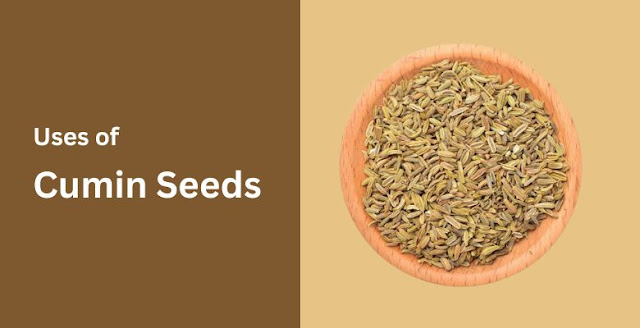The Versatile Uses of Cumin Seeds in Cooking and Beyond
Cumin seeds are a staple spice used in many cultures around the world. They have a unique flavor and aroma that can enhance the taste of various dishes. They are also known for their medicinal properties and have been used in traditional medicine for centuries. Cumin seeds have their origin in the eastern Mediterranean region and are a popular ingredient in many cuisines.
 |
| Uses of cumin seeds |
Culinary Uses of Cumin Seeds
Cumin seeds have a distinctive flavor that is slightly bitter, earthy, and nutty. They are commonly used in spice blends such as curry powder, garam masala, and chili powder. Cumin seeds can be added whole or ground to soups, stews, and sauces to add depth and complexity to the flavors. The seeds are also used in the preparation of traditional Indian dishes such as biryani and dal. Toasting cumin seeds before grinding them can enhance their flavor and aroma. Cumin seeds can also be used as a seasoning for vegetables, meats, and legumes.
Non-Culinary Uses of Cumin Seeds
Cumin seeds are also used for their medicinal properties. They contain compounds that have anti-inflammatory, antioxidant, and antimicrobial properties. In Traditional medicine, cumin seeds have been used to treat digestive issues, respiratory ailments, and skin problems. Cumin seeds are also used in skin care products for their anti-inflammatory properties that can soothe the skin. Cumin seeds are also used as a natural remedy for cold and flu symptoms by adding them to hot water or tea.
Cumin Seeds in Global Cuisines
Cumin seeds are a popular ingredient in many global cuisines. In Indian cuisine, cumin seeds are a staple spice and are used in many dishes. In Middle Eastern cuisine, cumin seeds are used in spice blends such as za’atar and ras el hanout. In Mexican cuisine, cumin seeds are used in dishes such as chili con carne and taco seasoning. Cumin seeds are also used in African and South American cuisine.
More about cumin seeds
- Cumin seeds supplied by one of the prominent Cumin Seeds Suppliers are rich in nutrients, including iron, magnesium, and vitamin B6. They also contain compounds such as cumin aldehyde and thymol that have antioxidant and antimicrobial properties.
- Cumin seeds are often used in combination with other spices, such as coriander, turmeric, and cinnamon, to create complex and flavorful spice blends.
- In addition to adding flavor to dishes, cumin seeds can also help with digestion. The essential oils in cumin seeds can stimulate the production of digestive enzymes, which can aid in the breakdown of food and the absorption of nutrients.
- When using cumin seeds in cooking, it's important to be mindful of the amount used as they can have a strong flavor. It's best to start with a small amount and adjust to taste.
- Cumin seeds can also be used as a natural insect repellent. Placing cumin seeds in areas where insects are present can help repel them due to the strong aroma of the seeds.
- In traditional medicine, cumin seeds are believed to have properties that can help with lactation and menstruation. However, scientists have to do more research on it to confirm these potential benefits.
- While cumin seeds are generally safe for consumption, some people may be allergic to them. It's always best to consult with a healthcare provider before adding any new food or supplement to your diet, especially if you have any pre-existing health conditions or take medication.
Also read: Benefits of Unhulled Sesame Seeds
Conclusion
Cumin seeds are a versatile ingredient that can enhance the flavor of many dishes. They are used in various global cuisines and have traditional medicinal uses too. Cumin seeds are a source of nutrients and have antioxidant and anti-inflammatory properties. By adding cumin seeds to your diet, you can explore new flavors and potential health benefits.



Comments
Post a Comment